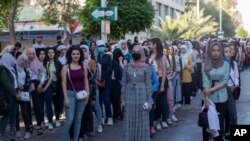Syria held its second presidential election Wednesday since civil war broke out in 2011, despite accusations from around the world the polling is not free and fair. Two candidates are vying with veteran President Bashar al-Assad, who came to office in 2000, following the death of his father, longtime ruler Hafez al-Assad.
Syrian state TV spoke with correspondents across the country Wednesday, showing at least a dozen polling stations on its screen throughout the day. Syrians in most regions of the country, except the Kurdish-controlled north and Turkish-controlled enclaves along the border, were eligible to vote.
President Bashar al-Assad and his wife, Asmaa, were shown on state TV voting in a Damascus suburb. Assad denounced western criticism about the election being free and fair.
He says that as a nation, Syria gives no credence to what (the Western states) are saying, but rather the most important thing is what the people say. The popular demonstrations in recent weeks were a sufficient and clear enough response to tell those countries that their comments are null and void.
Arab media, which oppose the Syrian government, showed video of a large crowd of protesters in the southern region of Daraa where the 2011 revolution began, calling for the ouster of the Assad government.
U.N. spokesperson Stephane Dujarric told the foreign press that the Syrian government did not follow U.N. Resolution 2254, which calls for a new constitution for the country, followed by U.N.-supervised elections.
"U.N. Resolution 2254 mandates that the U.N. facilitate the political process that would culminate in the holding of free and fair elections, in accordance with a new constitution administered under U.N. supervision,” he said.
Assad is vying with two other candidates in the election. Neither is expected to win more than 5% apiece. Assad won 89% of the vote during the last election in 2014. He has held the office since the death of his father, veteran Syrian leader Hafez al-Assad, who came to office in a coup in 1970.
Assad's media adviser, Boutheina Sha'aban, defended the election in interviews with Arab media, saying the countries that criticized the voting are the "same states that supported and financed terrorists since 2011 and would like to see Syria enter a constitutional void, which they tried in vain to create during the war."
Arab and Gulf states, she argues, should take heed of what she called "Washington's preoccupation with Russia and China, and restore ties with Damascus."
She says Saudi Arabia and other Gulf States are not happy because the U.S. is more preoccupied with China and Russia than with the Middle East, and the U.S. should resume relations with Damascus, which she argues is the backbone of Arab strength.
Paul Sullivan, who is a professor at the U.S. National Defense University in Washington, tells VOA the election is fundamentally flawed.
"This is a dictatorial coronation,” he said. “I can't see how anyone could take this election as democratic, given the state of what is left of the nightmare that is Syria, the dictatorial reign of the Assads, and the likely chance that he will win with over 95% of the vote."
Khattar Abou Diab, who teaches political science at the University of Paris, was equally scathing in his assessment.
He says the election is a "fait accompli," and no real strategic surprise. It's a sort of plebiscite, imposed on the people, to recognize the continuity of a dynastic republic that began in 2000, he said. Assad represents the state, the regime, and power, but he is just the shadow of his former self, kept under Russian and Iranian tutelage, he said.
Syria expert Joshua Landis, who teaches at the University of Oklahoma, argued in a tweet that the election is about "Assad declaring victory in the war, (along with) his wish that the revolution be seen to be over."
"(Assad's) unstated opponent," he adds, "is the Syrian opposition, who argue that the revolution (that began in 2011) can still succeed."




